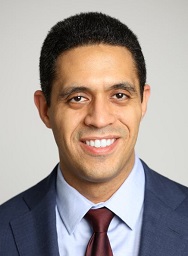Biography

Islam Fayed, MD, MS
Assistant Professor of Neurosurgery
Director, Stereotactic and Functional Neurosurgery
Education and Training
| Medical School: | Georgetown University School of Medicine, Washington, DC |
| Graduate School: | MS, Physiology and Biophysics - Georgetown University, Washington, DC |
| Residency: | Neurosurgery - MedStar Georgetown University Hospital, Washington, DC |
| Fellowship: | Stereotactic & Functional Neurosurgery - Thomas Jefferson University Hospital, Philadelphia, PA |
Board Certification
- American Board of Neurological Surgery
Memberships
- American Association of Neurological Surgeons
- Congress of Neurological Surgeons
- American Association of Neurological Surgeons/Congress of Neurological Surgeons
Section on Disorders of the Spine and Peripheral Nerves - American Epilepsy Society
- American Medical Association
- American Society for Stereotactic and Functional Neurosurgery
- North American Neuromodulation Society
Awards & Honors
The Amy and Edward Knight Award for Excellence in Neurosurgical Research, 2022; Charles Kuntz Scholar Award for excellence in neurosurgical research, 2019, 2021; Best Operative Technique Award in Stereotactic and Functional Neurosurgery - Congress of Neurological Surgeons Annual Meeting, 2019; SPIRIT Award for passion and commitment to patient care
About Me
Dr. Fayed is a neurosurgeon who specializes in movement disorder, epilepsy, and spine surgery. He completed his neurosurgical residency at MedStar Georgetown University Hospital in Washington, DC. During his residency, he completed an enfolded fellowship in Minimally Invasive & Complex Spine Surgery. He then went on to complete a fellowship in Stereotactic & Functional Neurosurgery at Thomas Jefferson University Hospital.
Dr. Fayed joined Cooper University Health Care as Director of Stereotactic & Functional Neurosurgery, specializing in the surgical treatment of movement disorders, epilepsy, chronic pain, spasticity, and emerging indications for psychiatric disorders. He specializes in deep brain stimulation and focused ultrasound treatment for Parkinson's disease, essential tremor, and dystonia. For epilepsy, he provides resective surgeries, including temporal lobectomy, minimally invasive laser and radiofrequency ablation, as well as responsive neurostimulation, deep brain stimulation, and vagus nerve stimulation. For chronic pain and spasticity, he provides spinal cord stimulation, dorsal root ganglion stimulation, and intrathecal pumps. He has a particular interest in minimally invasive and robotic approaches to epilepsy surgery and deep brain stimulation.
Dr. Fayed has also joined the Cooper Spine Center, adding expertise in minimally invasive spine surgery. These techniques utilize small incisions and muscle sparing approaches, as well as intraoperative CT navigation and robotic technology, to provide less invasive surgeries with faster recoveries to patients with degenerative, oncologic, and traumatic pathologies of the spine.
In addition to his clinical training, Dr. Fayed also completed a research fellowship at the National Institutes of Health (NIH). His primary research interests include defining the pathophysiology of epilepsy, as well as advanced imaging and robotic platforms in neurosurgery. He has published extensively and presented at various national and international conferences on these topics, and he hopes to advance cutting edge technologies in neurosurgery. He is also passionate about educating the next generation of neurosurgeons.